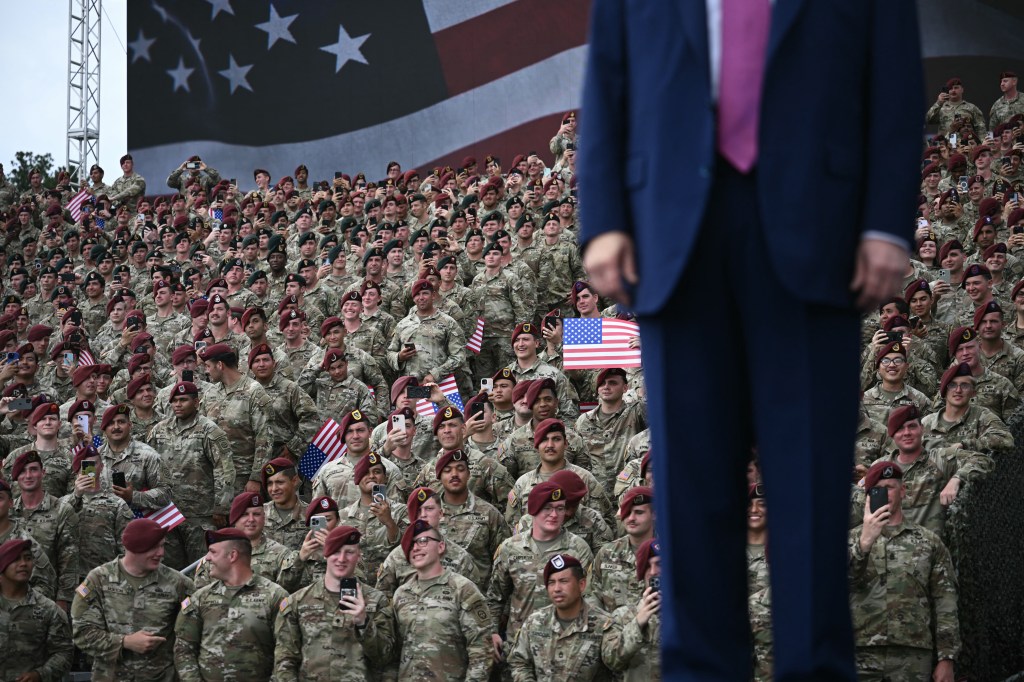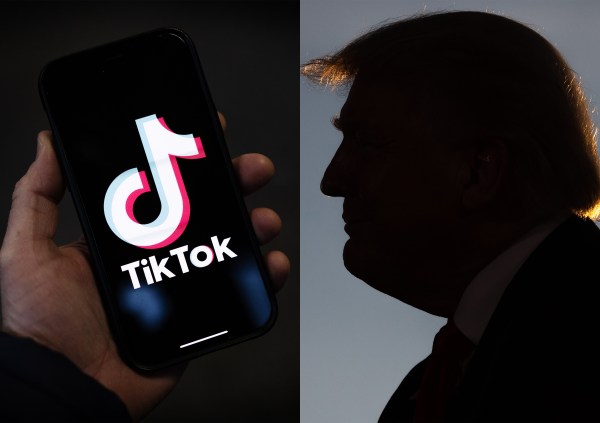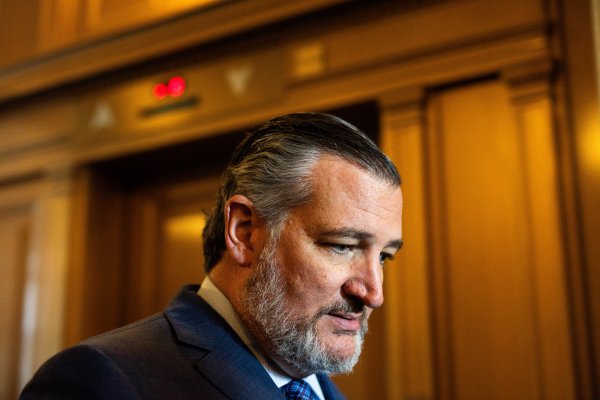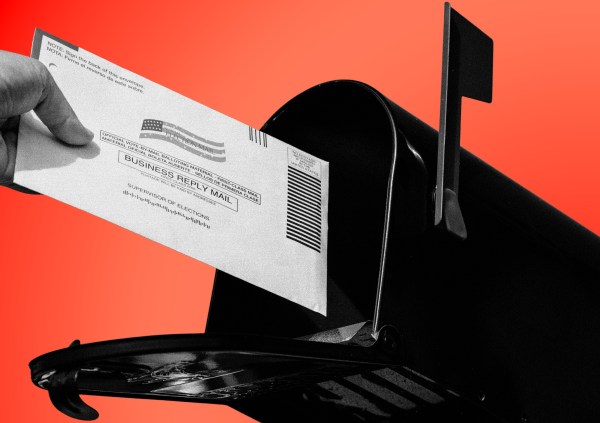The United States is a nation born in revolution, a fact that will be noted this weekend as the U.S. Army marks its 250th birthday, a year ahead of our nation’s own bisesquicentennial. Among the many factors that separates America from the trends of monarchism and tribalism we rejected those many years ago is the idea that the U.S. military, as professionals dedicated to preserving and defending the Constitution, remains rigidly apolitical. Unlike banana republics and tinpot dictatorships on other continents, American leaders do not count on the political influence and coercive force of the military to put or keep them in power.
On June 10, President Donald Trump traveled to “The Center of the Universe” (as Fort Bragg is known to those who have served there), part of the lead-up to this weekend’s celebration. He observed the awesome capabilities of the 82nd Airborne Division, engaged with service members from the U.S. Army Special Operations Command, and, getting the most attention, held a rally in front of hundreds of soldiers assigned to Fort Bragg. A president speaking to or in front of assembled troops is nothing new, nor should it necessarily be discouraged—the rare opportunity for soldiers to hear from their commander in chief in person can do wonders for morale. When I was in Iraq in 2003, President George W. Bush’s surreptitious arrival for a surprise Thanksgiving dinner boosted the spirits of not only those in attendance (including one of my soldiers who had been selected for the event), but also all of us in country at the time.
What does cause problems, however, is if the president—any president—starts engaging in partisan politics with the troops as a backdrop. It’s an even bigger issue if the troops engage along with him.
Trump, with Defense Secretary Pete Hegseth as his warm-up act, made statements during the event that, to varying degrees, boosted their political causes and drew targets on their political rivals. Nobody who has been watching the last decade of American politics should be surprised that Trump darted in and out of his prepared comments and riffed on things that occurred to him in the moment. Nor should anyone be surprised that 19-year-olds, in uniform or not, might engage in less than professional behavior, especially when whipped up or encouraged.
But just because we recognize these factors doesn’t mean we should accept what happened during the president’s visit to Bragg. Over the course of his speech, the president condemned, mocked, or berated his predecessor, an independent press, and elected Democrats, including one governor and likely 2028 candidate for president.
Some will dismiss this as Trump merely having fun, or just some young soldiers excited to cheer for a president they were thrilled to see in person. But small cracks in values lead to larger ones, and the president’s own statements called into question whether the soldiers in the crowd would have obeyed the orders of President Joe Biden, or whether their duty is directed by their political support for a given president. Further, the president evoked boos from the gathered soldiers when he called into question the competence of California Gov. Gavin Newsom, a man who could, potentially, be their next commander in chief. Most troubling, Trump repeated his claim that the 2020 election had been stolen from him. There should be something that unnerves us all a bit about representatives of the institution entrusted with the nation’s massive lethal force seeming to endorse a view that the previous commander in chief was illegitimate. The military cannot present, either overtly or subtly, that it institutionally has opinions on the orders or validity of those the voters select to lead them.
Konstantin Toropin and Steve Beynon of Military.com reported Wednesday that soldiers who were seated behind President Trump had been pre-screened for physically fit appearance and, alarmingly, political alignment. This is based on communications, which Toropin and Beynon reported they had seen, within various chains of command of the 82nd Airborne, which required that there would be “no fat soldiers” and that any soldiers who were not politically aligned with the current administration should identify themselves to be removed from the designated seating area.
Sean Parnell, Hegseth’s assistant for public affairs, flatly denied to Toropin and Beynon that such requirements were imposed. To put it diplomatically, Parnell has been quick to issue short denials and rebukes to the “fake media” for stories that, perhaps, he should have taken longer to check prior to denying. But, giving him the benefit of the doubt, this seems to potentially have been an example of overzealous junior leaders, exercising their initiative to achieve what they believe was desired—which is problematic in itself. These midlevel leaders may have believed their actions were intended to anticipate and prevent political actions (a sigh, an eye-roll, or some other nonverbal sign of disapproval from a soldier over the president’s shoulder), but by screening and separating soldiers based on ideology, they injected politics into the formation before Air Force One ever touched down in North Carolina.
Instead of presenting the soldiers as a representative sample, they created a crowd completely aligned with, and more likely to engage directly in, the president’s political statements. Like the knights who rid England’s King Henry II of his meddling cleric, these leaders took their anticipation of what was expected too far. Perhaps, instead, they should have preemptively reminded their soldiers of the expectations placed on them as members of the profession of arms.
Tom Nichols reacted to the Fort Bragg speech in the The Atlantic, rightfully frustrated at what he had witnessed along with the rest of us. Nichols called on uniformed leadership of the military to speak out and condemn the politicization of the military. While his anger is fully justified, his recommended remedy shows just what a tight spot the president had put those generals in. If they were to “stand … against” Trump as Nichols recommends, that criticism is, by its nature, another overtly political act. This kind of correction from the initial political breach, while it may seem intuitive, leads to the kind of situational decision making and constant reactions that got then-Gen. Mark Milley into sticky situations during his tenure as chairman of the Joint Chiefs of Staff. It is better for the military to stay far from the line.
Instead, Gen. Dan Caine, the current chairman of the Joint Chiefs, and the service chiefs should recognize that Tuesday represented a failure in the expectations of a professional military and remind the joint force of servicemembers’ obligation to remain firmly, completely apolitical. Not a message that appears to look up and out, pushing back at the president, but one that looks down and in, reinforcing the military as an immovable, professional rock in the tumultuous political storm that rages around it. They will serve the current president loyally in all legal orders, and they will serve the next president with the same loyalty, even if it turns out to be the California governor so many of them booed.
We are five months into the current Trump term, and as much as hope springs eternal, one should not put money on the White House developing a sudden concern for preserving and protecting the line between the military and politics. It will, therefore, fall on military leaders to preserve that separation—not by rebuke or counterreaction, but by example and through proactive messaging of the standards and discipline that make the American military, as protectors of this great experiment, exceptional.









Please note that we at The Dispatch hold ourselves, our work, and our commenters to a higher standard than other places on the internet. We welcome comments that foster genuine debate or discussion—including comments critical of us or our work—but responses that include ad hominem attacks on fellow Dispatch members or are intended to stoke fear and anger may be moderated.
With your membership, you only have the ability to comment on The Morning Dispatch articles. Consider upgrading to join the conversation everywhere.